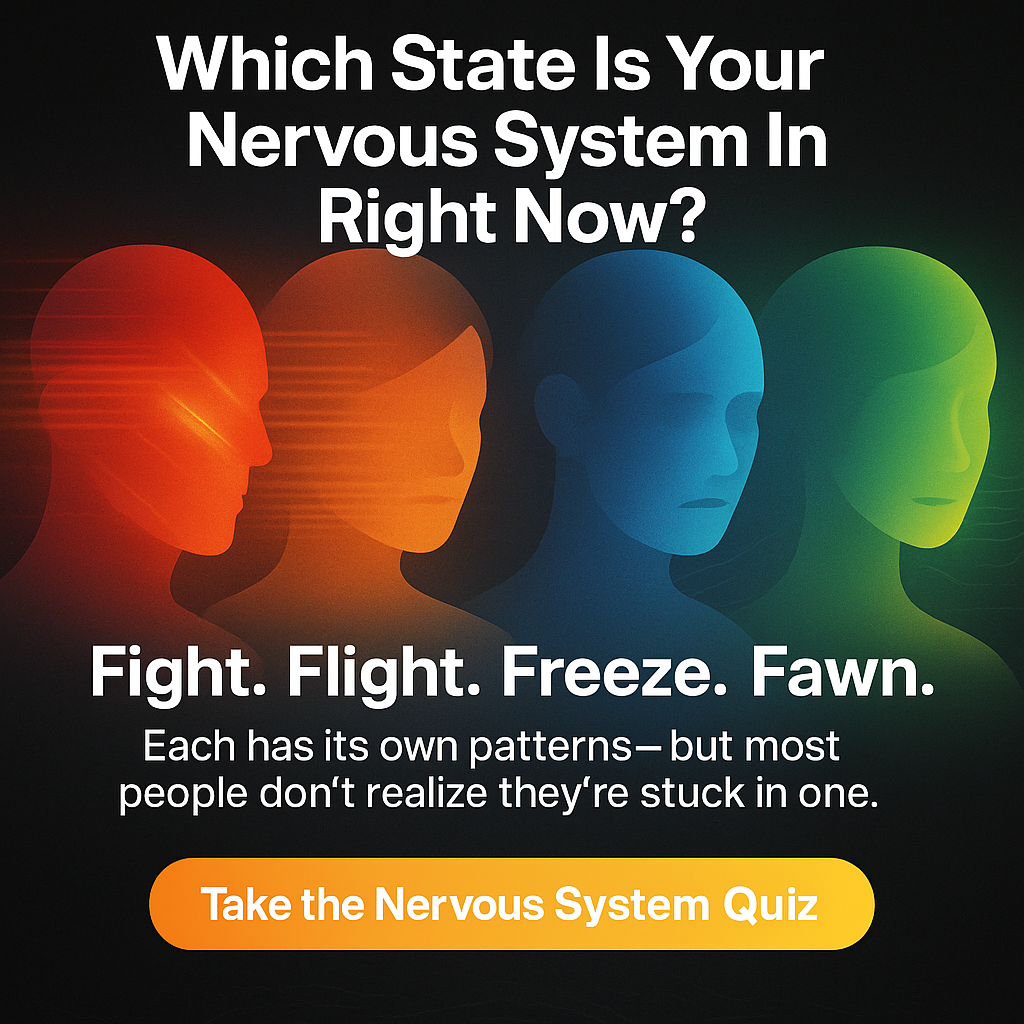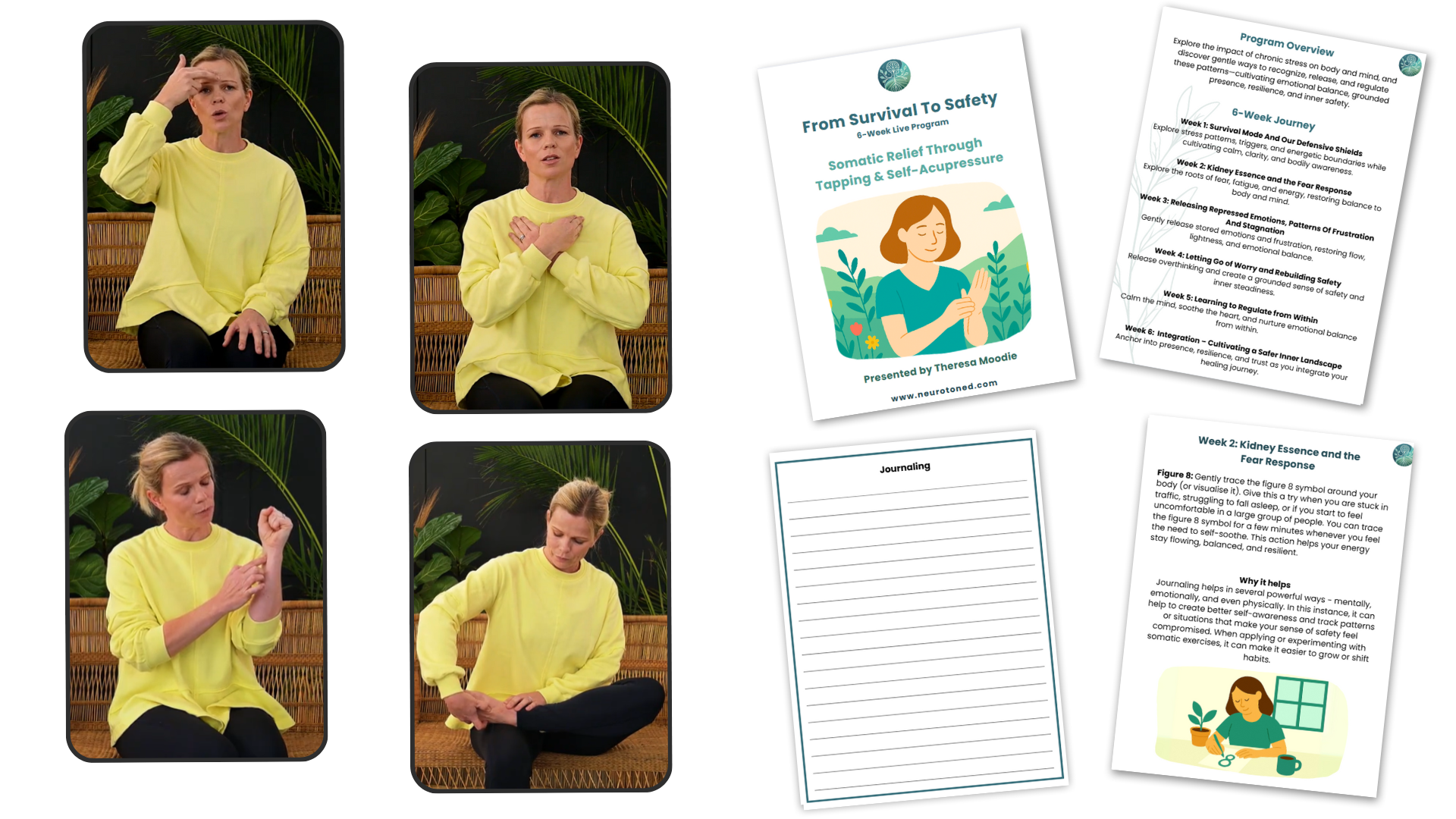
A Gentle Nervous System Plan for Holiday Stress
The holidays can bring both warmth and overwhelm. Even joyful moments can stir anxiety, tension, or exhaustion. If you find yourself bracing for family gatherings, long to-do lists, or emotional triggers, you’re not alone.
You can take the Stress Loop Quiz to see which part of your nervous system might be running the show before the season begins.
Quick Answer: How to Calm Holiday Stress
The best way to handle holiday stress is to prepare your nervous system before it peaks. Start by keeping your body hydrated, setting small boundaries, and using grounding techniques like slow exhalations or gentle tapping. When tension rises, pause for brief “micro-regulations”—moments to notice your breath, your feet, or a safe object near you. After the holidays, give your body a few quiet days to re-regulate with rest, warmth, and slow reconnection.
Why the Holidays Trigger the Stress Loop
Your nervous system reads more than your calendar. It tracks tone, speed, and emotion. Even happy chaos—lights, noise, schedules—can register as threat when your body’s already on alert.
If you often feel “ready to jump out of your skin for no reason,” it might be your body’s survival system overreacting, not a lack of willpower. You can learn more about this pattern in this gentle explainer on chronic alertness.
When you understand that your body’s reactions are protective, not personal, you start meeting stress with kindness instead of shame.
Step 1: Anchor Before the Rush
Try to begin each morning with one sensory cue of safety:
- Place a warm hand on your chest before checking messages.
- Notice the floor under your feet while making tea.
- Whisper, “I’m allowed to go slowly.”
Even a few seconds of grounded attention helps widen your body’s window of tolerance, the space where calm and connection can exist together. You can explore this more deeply in How to Widen Your Window of Tolerance Daily.
If deep breathing feels uncomfortable, that’s okay. Some people find traditional breathwork increases anxiety. Try a softer version shared in Why Deep Breathing Makes Me More Anxious, And What To Do Instead.
Step 2: Use Tiny Regulation Breaks
During gatherings, plan short “micro-resets.” Step outside, stretch your fingers, or find something neutral to look at. These moments tell your vagus nerve you’re still safe.
You can learn other gentle ways to activate calm without gadgets in Vagus Nerve Stimulation Exercises Without Devices.
If emotions rise suddenly, grounding through touch or pressure may help. Try pressing your feet gently into the floor or your palms together. A brief how-to is in Grounding During Panic Without Talk Therapy: A Gentle Guide You Can Use Anywhere.
Step 3: Nourish Your System (Not Just Your Plate)
Your body’s fluid balance directly affects nervous system regulation. Simple hydration cues may ease fatigue and irritability. Read how water supports calm in Hydration for Nervous System Regulation.
Also, try small bites and slow chewing. The vagus nerve runs through your digestive system. Eating calmly is a regulation practice on its own.
Step 4: Reset After the Holidays
Once the gatherings fade, your body might feel flat or numb. This is often a “shutdown” phase after prolonged activation. If this happens, treat yourself gently.
Use slow pendulation, shifting awareness between comfort and tension, to restore balance. See Pendulation: A Simple Somatic Exercise to Calm Your Nervous System.
You can also follow a full reset from How To Reset Your Nervous System After Trauma.
14-Day Holiday Stress Regulation Plan
Days 1–3: Prepare
-
Add hydration reminders.
-
Choose a sensory cue of safety each morning.
-
Take the Stress Loop Quiz to notice your main stress pattern.
Days 4–7: Practice Micro-Regulation
-
One grounding pause before each event.
-
Gentle vagus nerve exercise once per day.
-
Stretch or shake your hands before bed.
Days 8–11: Protect Your Energy
-
Limit multitasking.
-
Short daily walks, even indoors.
-
Use the phrase “let me think about it” as a nervous system boundary.
Days 12–14: Post-Holiday Recovery
-
Sleep, hydrate, and rest.
-
Try pendulation or slow tapping.
-
Journal one moment each day when you felt safe.
Common Sticking Points
“I can’t find time to slow down.”
Even 10 seconds counts. It’s not about stopping your life, it’s about changing how you move through it.
“My family doesn’t understand boundaries.”
Start with internal ones: your breath, your pace, your tone. Your body is your first boundary.
“I crash after holidays.”
That’s natural. Your system has been running on alert. Try a few vagus nerve breathing steps to ease the transition.
FAQs
1. Why do the holidays make my anxiety worse?
Holiday events add sensory and emotional load. The nervous system reads fast schedules, noise, and emotional tension as possible threats, even when you’re safe.
2. How can I regulate my nervous system quickly during family gatherings?
Pause for a soft exhale, feel your feet, or find a calm visual anchor like a tree or light source.
3. What if I feel nothing or go numb?
That’s a protective state. Read Why Your Body Goes Numb During Stress for gentle reconnection ideas.
4. How can I recover from emotional exhaustion afterward?
Give yourself rest and quiet routines. Even small resets like a 10-minute nervous system reset can help.
5. Can hydration and sleep really affect stress levels?
Yes. Your nervous system relies on body stability. Water and rest are simple but powerful regulation tools.
Take the Stress Loop Quiz to discover your stress pattern and get personalized calm practices.
More Gentle Reads
Disclaimer: This article is educational and not medical advice. If you have health concerns, consider speaking with a qualified professional.
Discover Your Vagal Tone
Find out how dysregulated your nervous system is and get your personalized roadmap to feeling calm, energized, and in control


